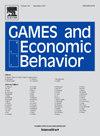善恶之战中的上游互惠
IF 1
3区 经济学
Q3 ECONOMICS
引用次数: 0
摘要
上游互惠,通俗地说就是“把善意传递出去”,是对不相关的第三方的善意回报。“负上游互惠”指的是对不相关的第三方做出不友好的回应。本研究提出了上游互惠的实验检验和两种形式的对比。关于信任和感激的调查问题补充了这项研究。结果显示了上游互惠正向的证据,但不利于其负对应物。即使在得到电脑的帮助后,实验对象也会继续向前,这表明这种效果是自我参照的。研究结果扩展了感恩的心理学理论,表明感恩在社会交往中起到“缓冲”或“调节器”的作用,抵御帮助或伤害的影响。结果与亚当·斯密在《道德情操论》中描述的社会互动原则相一致,使我们能够理解观察到的行为。本文章由计算机程序翻译,如有差异,请以英文原文为准。
Upstream reciprocity in the battle of good vs evil
Upstream reciprocity, known colloquially as “pay-it-forward”, is reciprocating an act of kindness to an unrelated third party. “Negative upstream reciprocity” means reciprocating an unkind act to an unrelated third party. The present research proposes an experimental test of upstream reciprocity and contrast between its two forms. Survey questions on trust and gratitude complement the study. Results show evidence of positive upstream reciprocity but against its negative counterpart. Subjects pay forward even after being helped by a computer, indicating that the effect is self-referential. Results extend psychological theories of gratitude by showing that gratitude functions as a “buffer” or “regulator” against the impact of help or harm in social interactions. Results align with the social interaction principles described by Adam Smith in The Theory of Moral Sentiments, informing our understanding of the observed behavior.
求助全文
通过发布文献求助,成功后即可免费获取论文全文。
去求助
来源期刊

Games and Economic Behavior
ECONOMICS-
CiteScore
1.90
自引率
9.10%
发文量
148
期刊介绍:
Games and Economic Behavior facilitates cross-fertilization between theories and applications of game theoretic reasoning. It consistently attracts the best quality and most creative papers in interdisciplinary studies within the social, biological, and mathematical sciences. Most readers recognize it as the leading journal in game theory. Research Areas Include: • Game theory • Economics • Political science • Biology • Computer science • Mathematics • Psychology
 求助内容:
求助内容: 应助结果提醒方式:
应助结果提醒方式:


